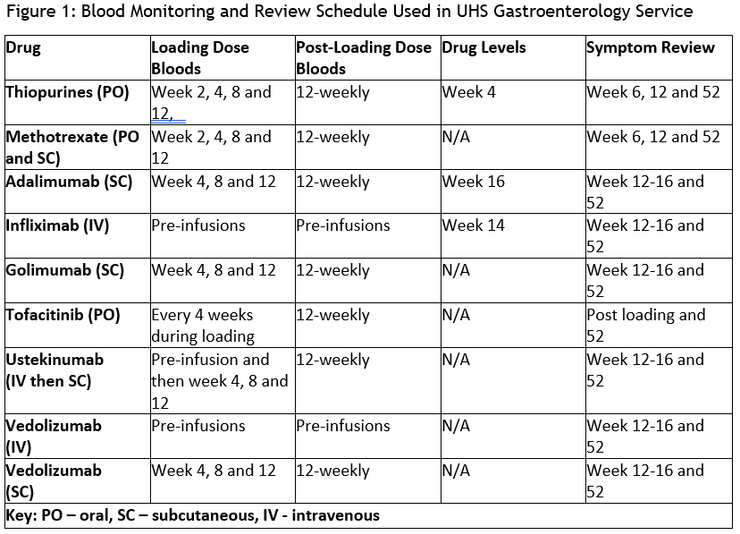Robust patient review processes are crucial to ensuring the safety and efficacy of IBD medications, including immunomodulators. However, the workload required from such reviews can put significant strain on staff.
The IBD UK Standards recommends clear protocols should be in place for the supply, monitoring and review of medication - which can help not only with patient outcomes, but also with ensuring that existing processes are time-efficient and cost-effective.
Who’s doing it well?
At University Hospitals Sussex (UHS), immunomodulator reviews are completed by a multi-disciplinary team (MDT), with specialised pharmacists and nurses leading on autonomous blood monitoring and symptom review. This work was led by Fiona Rees, Lead Pharmacist for Gastroenterology at Royal Sussex County Hospital.
What wasn't working?
The workload of the review process was increasing and putting considerable strain on the team - particularly pertinent in the Covid pandemic, which resulted in staff shortages. There was also short availability of experienced gastroenterology staff to employ into specialist roles, with training and recruitment not matching demand. Business cases for improved IT systems at UHS to aid with monitoring had been denied.
The idea
Upskilling and task shifting is recognised as legitimate strategy for service enhancement, care access, cost effectiveness and sustainability, plus ensures team flexibility, boosted morale and career progression. The UHS IBD team includes a highly motivated pharmacy technician (PT). In the UK, pharmacy technicians are registered non-prescribing healthcare professionals, but training does not include autonomous blood monitoring and symptom review.
We wanted to determine if with appropriate training and support, pharmacy technicians can become competent in immunomodulator blood monitoring and symptom review to aid MDT capacity and PT development.
To ensure competency of autonomous blood monitoring and symptom review, a training package was developed and was approved by UHS Medicines Governance Committee.
The pharmacy technician completed the training in 10 weeks. Once accredited, the pharmacy technician prospectively recorded blood monitoring and symptom review activity over 24-weeks plus referrals completed via a single-centre study.
Results
Over 24 weeks, the pharmacy technician completed 2047 distinct monitoring activities, with 178 (9%) needing referral to a specialised pharmacist. All referrals to the specialised pharmacist were appropriate as they needed action by a prescribing professional. The highest proportion of autonomous workload was observed in the IBD infusion clinic (801, 39%), followed by thiopurine monitoring (697, 34%) and then ‘others’ (323, 16%).
‘Others’ were essential activities including faecal calprotectin levels (FCPL), pre-initiation tests (e.g.thiopurine methyltransferase levels (TPMT), viral screening, t-spots) and medication levels to optimise therapy. In addition, PT contributed substantially to data collection for virtual biologic clinic (VBIC) reviews; 48 patients.
References:
1. Crohn’s disease: management NICE guideline [NG129]. Published: 03 May 2019. Available from https://www.nice.org.uk/guidance/ng129
2. Ulcerative colitis: management NICE guideline [NG130]. Published: 03 May 2019. Available from https://www.nice.org.uk/guidance/ng130
3. Lamb CA, Kennedy NA, Raine T, et al. British Society of Gastroenterology consensus guidelines on the management of inflammatory bowel disease in adults. Gut 2019;68:s1-s106. Available from https://gut.bmj.com/content/68/Suppl_3/s1
4. World Health Organisation. Task shifting:global recommendations and guidelines. 2008. Available from https://www.who.int/workforcealliance/knowledge/resources/taskshifting_guidelines/en/
5. MalterudK, AamlandA & Fosse A (2020) How can task shifting put patient safety at risk? A qualitative study of experiences among general practitioners in Norway, Scandinavian Journal of Primary Health Care, 38:1, 24-32, Available from https://www.tandfonline.com/doi/full/10.1080/02813432.2020.1714143
6. FeiringE, Lie AE. Factors perceived to influence implementation of task shifting in highly specialisedhealthcare: a theory-based qualitative approach. BMC Health Serv Res 18, 899 (2018). Available from https://bmchealthservres.biomedcentral.com/articles/10.1186/s12913-018-3719-0
7. NHSE. NHS People Plan 2020-21: Making the most of the skills in our teams. Available from https://www.england.nhs.uk/ournhspeople/online-version/new-ways-of-working-and-delivering-care/making-the-most-of-the-skills-in-our-teams/
8. General Pharmaceutical Council: Registering as a pharmacy technician. Available from https://www.pharmacyregulation.org/registration/registering-pharmacy-technician
9. British Society of Gastroenterology Workforce Report 2021. February 2022. https://www.bsg.org.uk/wp-cont...;
10. Williams JG, Roberts SE, Ali MF, Cheung WY, Cohen DR, Demery G, Edwards A, Greer M, Hellier MD, Hutchings HA, Ip B, Longo MF, Russell IT, Snooks HA, Williams JC. Gastroenterology services in the UK. The burden of disease, and the organisation and delivery of services for gastrointestinal and liver disorders: a review of the evidence. Gut. 2007 Feb;56 Suppl 1(Suppl 1):1-113. doi: 10.1136/gut.2006.117598
